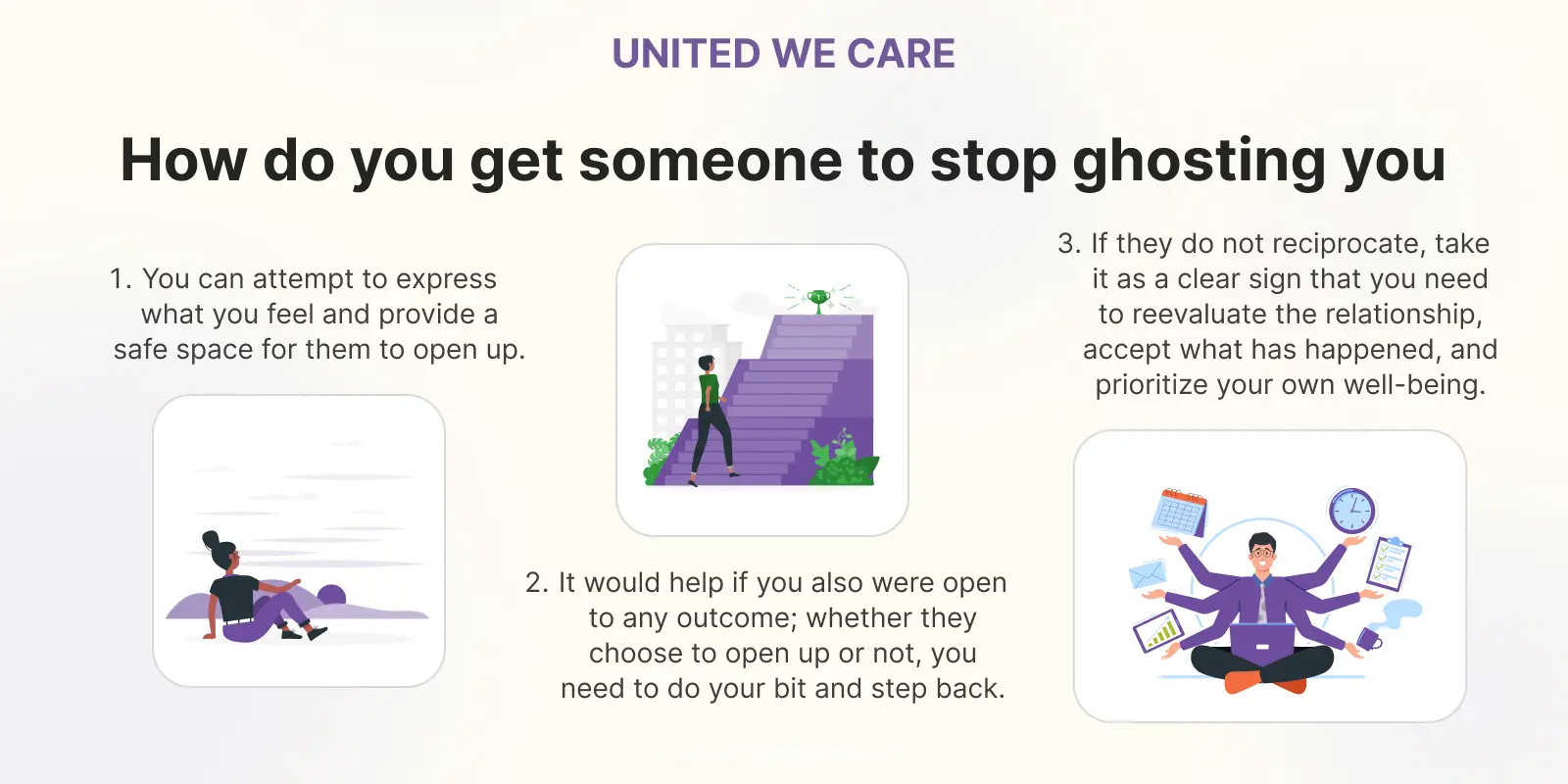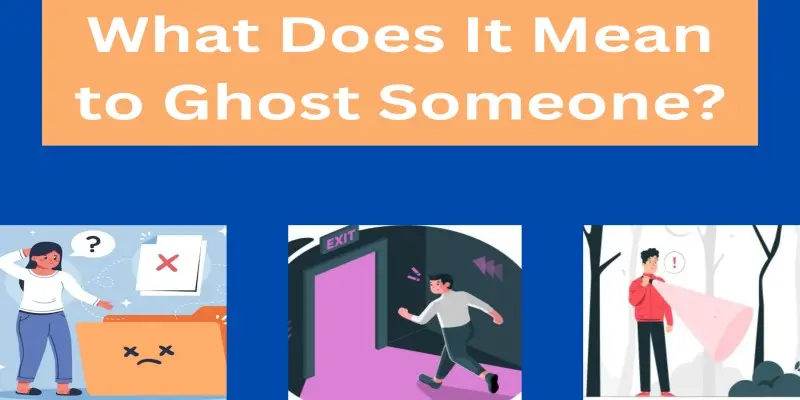Introduction
Imagine this: you made a new friend recently, and for the past few weeks, you’ve been having a ball with them. You’ve spent so much time together in a short period, and it’s been fun each time. When you’re not together in person, you’re either sharing memes or updating each other on messages with the smallest details about your day. But lately, they’ve canceled on you multiple times back to back without a reason. You’ve even tried reaching them over calls and messages, but they either leave you on seen or simply don’t answer your call. You feel lost and confused. You miss your friend. This is what ghosting someone looks like.
What is ghosting?
When you think of a ghost, you may think of a lingering presence, silence, mystery, unfinished business, and haunting. Similarly, the act of ghosting symbolizes someone who suddenly and without any explanation disappears by withdrawing from all forms of communication with the person they’re ghosting.[1]
You may think ghosting is the same as ignoring someone, but it’s not. When you ignore someone, you may be doing so temporarily, choosing not to respond over certain communication channels but still maintain some level of contact or simply ignore certain topics of conversation. You do not intend to end the relationship altogether; just take some distance from it.
But when you’re ghosting someone, you totally cut off all communication without a warning or explanation, with the intention of ending the relationship. When the person you’re ghosting tries to seek clarification, you shut them out with silent treatment.
While being ignored can be confusing and hurtful, being ghosted can make you feel self-doubt, rejected, frustrated, anxious, angry, and helpless.
If ghosting is such a negative experience, why do people subject others to it, even people they seemingly like and care about? The act of ghosting may be rooted in the ghoster’s personal issues, the way they view relationships, and the way we function as a society. Some common reasons why people ghost others are:
- They want to avoid going through the discomfort of letting someone down and admitting that they do not want to continue the relationship. They do not want to be confronted about their decision.
- They start getting scared when they feel close to someone. They feel vulnerable and don’t want to be hurt. So, they resort to withdrawing from the relationship altogether.
- They’re simply too overwhelmed with something going on in their life and are unable to communicate it. They feel it is easier to pull away without explanation.
- They want to feel in control, and hence, by ghosting someone, they are able to decide when and how they want to put a stop to communication and the relationship.
The digital world has made it all the more easier to ghost people. When we’re online, we feel more anonymous, less accountable, and have so many connections simultaneously that we feel it’s okay to just randomly drop a few without thinking of the consequences.[2]
What should you say to someone who ghosted you?
Communicating with someone who has ghosted you can be challenging because, one, they have shut you off and are not even acknowledging your attempts, and two, it’s a matter of self-respect for you. However, if you’re looking for some understanding of what happened or even seeking closure, it is important to communicate with clarity.
- Begin with reflecting on your feelings and what it is that you’re looking for from the conversation. Are you looking for an explanation? An apology? Or to vent your feelings?
- Don’t accuse and blame them straight away. Use “I” statements to communicate your feelings. Don’t be afraid to be vulnerable and express honestly what the ghosting experience made you feel.
- To err is human, so give them the benefit of the doubt and don’t make assumptions or jump to conclusions. Give them space to open up.
- If they’re clearly not reciprocating and still refusing to have difficult conversations, it’s best to give them an out. You can make it clear to them that it’s okay if they don’t wish to continue the relationship, although you would appreciate it if they told you that directly instead of leaving you hanging.
- Let them know what kind of behavior is and isn’t acceptable for you, and draw boundaries to protect your well-being. Be clear about not tolerating ghosting in the future.
How does the ghoster feel after ghosting someone?
How the ghoster feels after ghosting someone totally depends on the person, situation, and the reason behind the ghosting. If their goal was to avoid a difficult conversation or confrontation, they might feel relief after ghosting. If, after ghosting, they feel like what they did wasn’t the best way to handle the situation, they might feel doubt, guilt, and regret. They might also feel fearful and anxious if they’re worried about the person they ghosted coming to them for closure. Ultimately, if they’re ghosting a lot of people, they end up feeling lonely.
How do you get someone to stop ghosting you?
It is important to understand that you cannot “stop” someone from ghosting you, and you cannot force them into talking to you and straightening things out. Yes, this situation can feel frustrating, but you need to respect your own and their boundaries.

- You can attempt to express what you feel and provide a safe space for them to open up.
- It would help if you also were open to any outcome; whether they choose to open up or not, you need to do your bit and step back.
- If they do not reciprocate, take it as a clear sign that you need to reevaluate the relationship, accept what has happened, and prioritize your well-being.
How to apologize for ghosting someone:
If you find that you have knowingly or unknowingly ghosted someone, and you do not feel aligned with that behavior, you must offer a sincere apology to them. When you apologize, make sure you’re not making excuses for your behavior. Instead, simply acknowledge your behavior, tell your side of the story, and express that you do feel bad for hurting them. You must also tell them how you’ll handle the situation differently in the future. Once you’ve done your part, give them the space to express anything else they’d like to add. It is important to end the conversation properly, so wish them well and let things unfold naturally.
Conclusion
As humans, we wish to be seen, heard, and valued, especially by those we consider close to us. Ghosting can be a confusing, frustrating, and hurtful experience.[3] If you find that someone has ghosted you, you can calmly confront them and give them the space to tell their side of the story. If they do not reciprocate your efforts, you need to find closure within by engaging in self-care. If you are the ghoster, you must rectify your behavior. In that case, you must offer a sincere apology, take responsibility for your behavior without making any excuses, and express how you’ll handle difficult situations differently in the future. A mental health professional can help you with strategies for modifying your ghosting behavior and also help deal with a situation where you’ve been ghosted. At United We Care, we offer the most appropriate, clinically backed solutions for all your well-being needs.
References:
[1] American Psychological Association, “What to Do When You’ve Been Ghosted with Jennice Vilhauer, Ph.D.,” in Speaking of Psychology. [Podcast]. Available: https://www.apa.org/news/podcasts/speaking-of-psychology/ghosting. Accessed on: October 31, 2023
[2] Narcissa M. Punyanunt-Carter, Jason S. Wrench, “The Impact of Social Media in Modern Romantic Relationships,” Lexington Books, 2017, pp. 219. [Online]. Available: https://books.google.co.in/books?id=SMUpDwAAQBAJ&lpg=PA219. Accessed on: October 31, 2023
[3] Raúl Navarro, Elisa Larrañaga, Santiago Yubero, and Beatriz Víllora, “Psychological Correlates of Ghosting and Breadcrumbing Experiences: A Preliminary Study among Adults,” in Int. J. Environ. Res. Public Health, vol. 17, no. 3, pp. 1116, 2020. [Online]. Available: https://doi.org/10.3390/ijerph17031116. Accessed on: October 31, 2023










